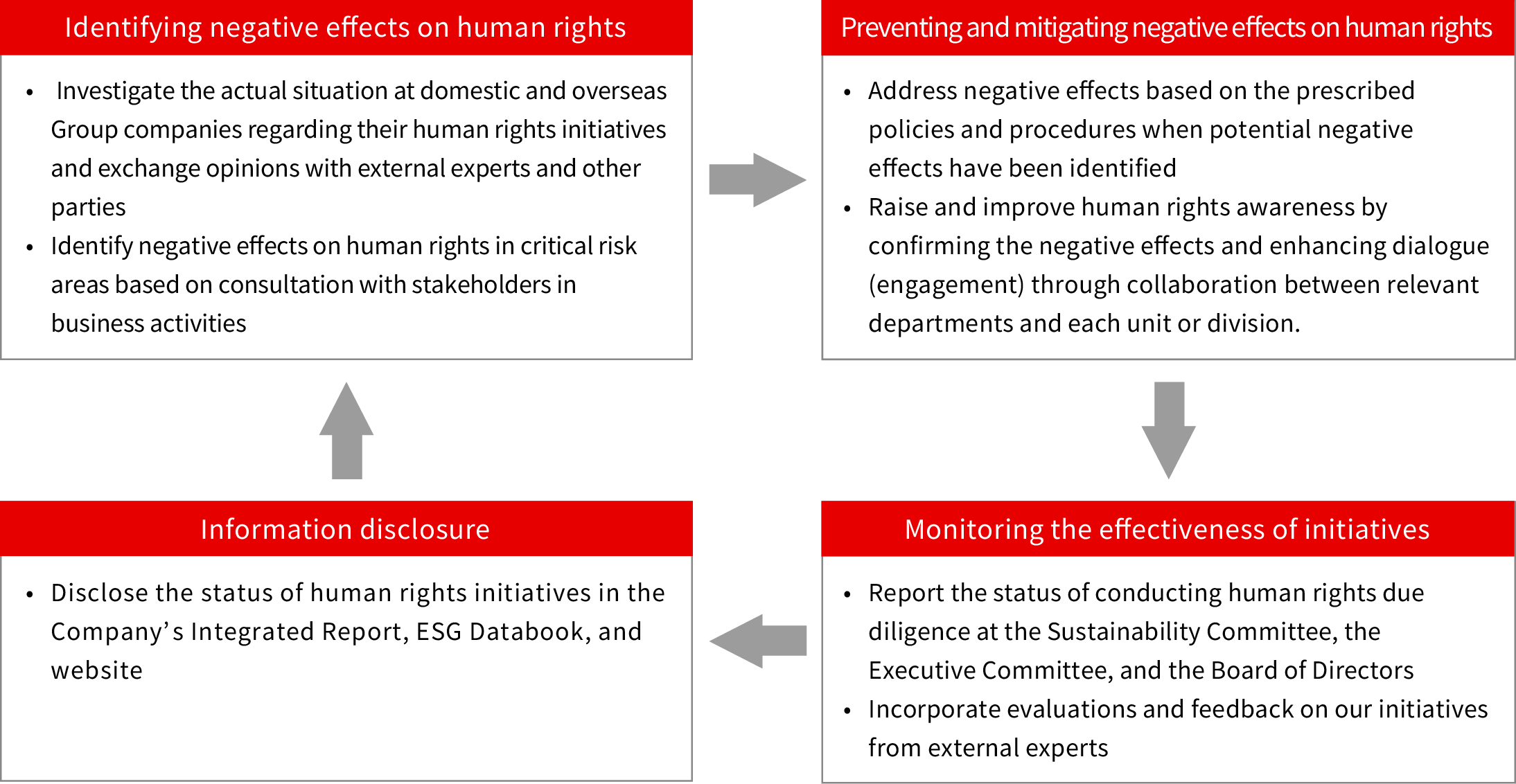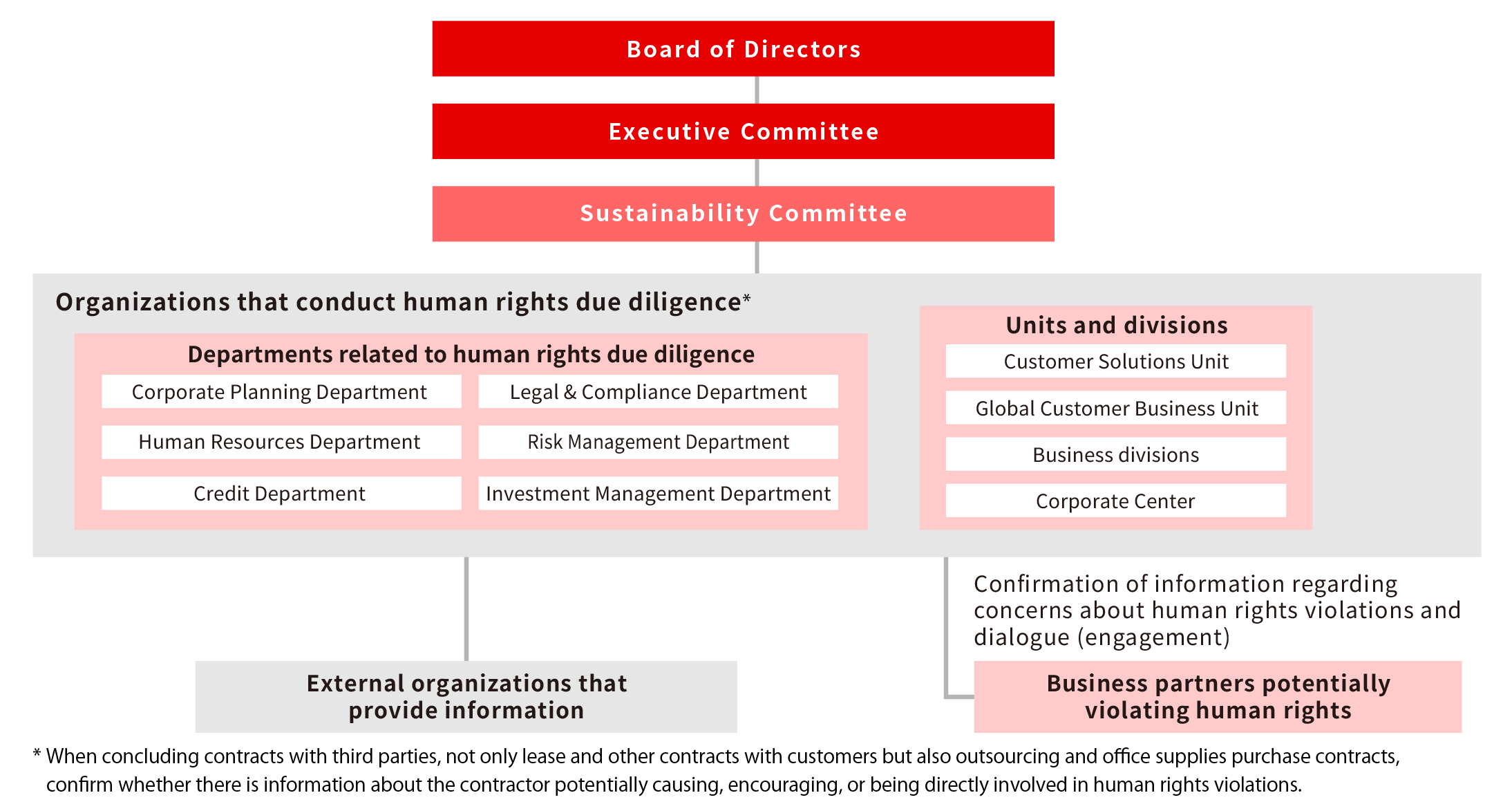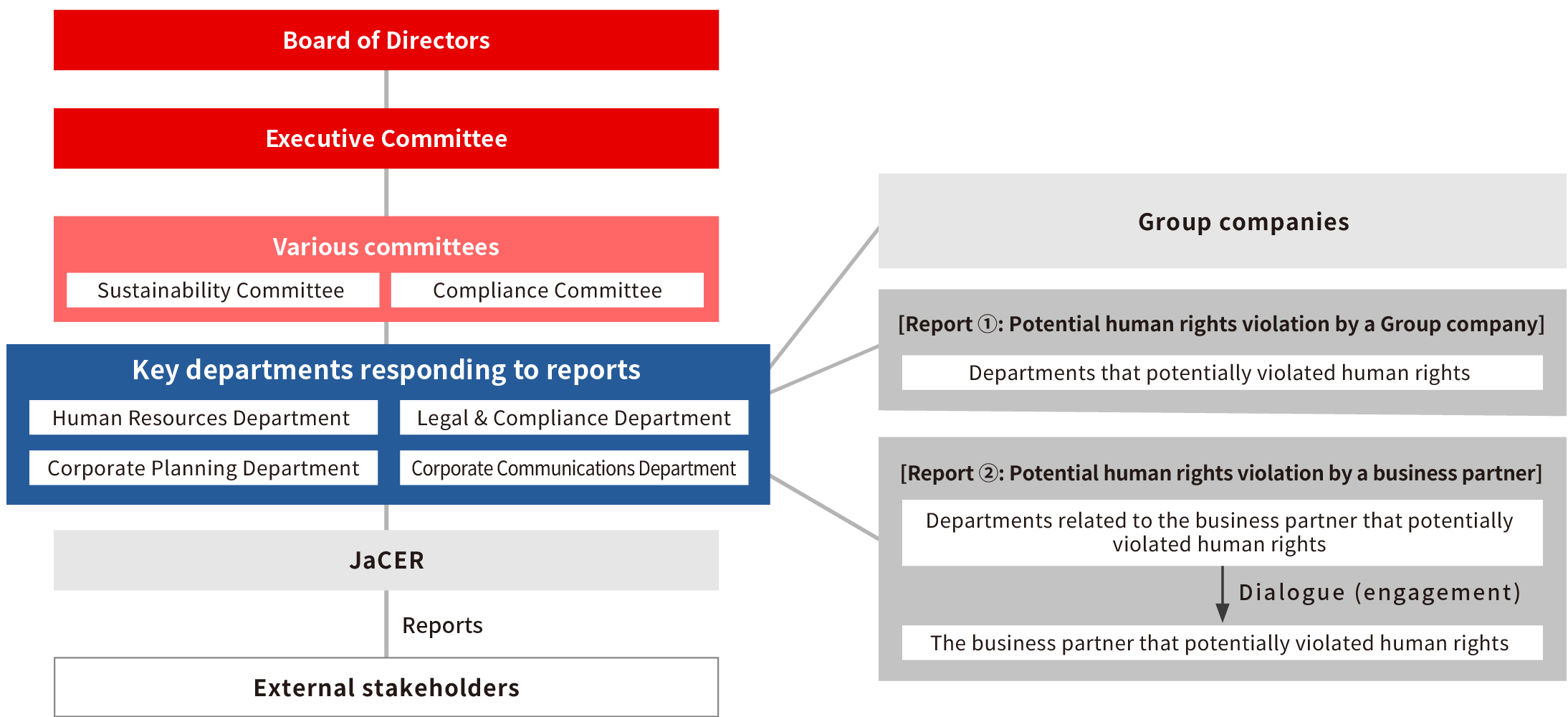Social
Human Rights Initiatives
Mitsubishi HC Capital Group recognizes that human rights and labor practices are important issues for achieving our mission and expanding its business footprint globally. We strive to carry out business activities while respecting the human rights of all people.
Human Rights Policy
We have established a policy to proactively and continuously conduct our business activities in consideration of internationally recognized standards and the like concerning human rights, and we will fulfill our responsibility to respect human rights, as is expected of global companies.
Basic Policy on Human Rights
The Group’s Code of Ethics and Conduct includes sections on "Respect for Human Rights and the Environment," and the Code of Conduct states, under "Human rights," that "Consistent with the fundamental spirit of respect for humanity, no employee engages in any discriminatory action or human rights violation on the ground of gender, sexual orientation, age, nationality, race, ethnicity, political opinion, beliefs, religion, social status, lineage, illness, or disability."
Furthermore, we respect and support international norms concerning human rights, labor, the environment, and antibribery, including the International Bill of Human Rights, the Ten Principles of the United Nations Global Compact, the OECD Guidelines for Multinational Enterprises on Responsible Business Conduct, the Guiding Principles on Business and Human Rights (Ruggie Framework), the ILO Declaration on Fundamental Principles and Rights at Work, and the Children's Rights and Business Principles. We strive to respect the human rights of all stakeholders under these basic principles on human rights.
The Group's compliance manual states, under "Respect for human rights and the prohibition of discrimination," that "All Group employees must respect basic human rights and must not engage in any discriminatory action or human rights violation on the ground of gender, sexual orientation, age, nationality, race, ethnicity, political opinion, beliefs, religion, social status, lineage, illness, or disability." Under "Eliminating harassment," it further states, "All Group employees should respect one another as professional partners and must work to eliminate all forms of harassment, including sexual harassment, harassment related to pregnancy, and abuse of power."
Human rights due diligence
The Group began conducting human rights due diligence in FY2023, targeting credit transactions and outsourcing transactions. A company-wide, cross-segment Human Rights Project was launched in FY2022 through which a series of discussions were held and a human rights due diligence system was developed over the course of about one year. In FY2024, we added purchase transactions and investment transactions to the scope of transactions subject to human rights due diligence. We continue to improve and enhance our human rights due diligence system by incorporating feedback from business divisions and other frontline departments and exchanging opinions with external experts.
We conduct the following two activities through human rights due diligence.
- Screening business partners based on information regarding concerns about human rights violations
We have established a system for identifying business partners with concerns about human rights violations in critical risk areas by cooperating with an external information vendor. - Dialogue (engagement) with business partners to eliminate the risk of human rights violations
Where concerns have been identified through screening, we open a dialogue (engage) with the business partners and, by confirming the actual situation and their responses, we encourage them to respect human rights.
The Group is working on initiatives to respect human rights based on the Guiding Principles on Business and Human Rights Guiding Principles on Business and Human Rights and other guidelines. The main objective of human rights due diligence is to prevent human rights risks in our corporate activities and reduce their impacts by improving and enhancing human rights awareness at our business partners through dialogue (engagement).
Processes of conducting human rights due diligence

Human rights due diligence framework
When a unit/division recognizes information on a potential human rights violation by a business partner, it considers and determines a response policy in collaboration with relevant departments, based on which it has a dialogue (engagement) with the business partner. The status of implementing human rights due diligence is first reported to the Sustainability Committee and then also to the Executive Committee and the Borad of Directors.

Identifying critical risk areas
In order to address various types of human rights issues in consideration of how serious and probable they are, we have identified critical risk areas through the following process.
- Investigate the actual status of human rights initiatives conducted at domestic and overseas Group companies, and gain a comprehensive understanding of whether they have systems to screen business partners, the areas of human rights risk recognized by them, and specific human rights issues.
- Investigate situations of concern in each business regarding the human right issues identified in ①. Compare the results of the investigation with the human rights risk areas in the regions of where the Group companies operate and identify the relevant human rights risk areas.
- Confirm the appropriateness of the human rights risk areas identified in ② by exchanging opinions with external experts and conducting verification based on the Ten Principles of the United Nations Global Compact and other international norms, and specify critical risk areas.
In order to respond to changing situations surrounding human rights, we continue to review critical risk areas through ongoing investigations and information gathering, and dialogue with stakeholders.
| Identified critical risk areas | Targets (examples of general human rights issues) |
|---|---|
| Occupational health and safety |
|
| Forced labor and human trafficking |
|
| Child labor |
|
| Discrimination and gender |
|
| Impacts on surrounding areas |
|
Status of human rights due diligence for business partners
- November 2023-March 2024
- Confirmed the occurrence of a human rights violation at a business partner suspected of potential human rights violation, whether the potential human rights violation is related to the transaction with the Group, and that there were problems in the business partner’s stance on respecting human rights.
Our response to inquiries and whistleblowing concerning human rights (complaint handling mechanism)
We receive consultation requests concerning human rights from our employees, including those of Group companies, through our internal whistleblowing systems: the Compliance Hotline and the Sexual/Maternity/Sexual Orientation and Gender Identity (SOGI) Harassment Hotline.
We receive consultation requests and inquiries related to human rights from all stakeholders outside the Company through a multilingual human rights hotline that makes use of the Engagement and Remedy Platform operated by the Japan Center for Engagement and Remedy on Business and Human Rights (JaCER). Care is taken to protect whistleblowers, and anonymous reports are also accepted. Details of inquiries and consultations are handled with the utmost care; information is kept confidential and disadvantageous treatment of whistleblowers is prohibited. Depending on the circumstances, information may be shared within an appropriate scope.
In FY2024, we received one complaint through the human rights hotlines we have established. In coordination with relevant departments, we investigated the facts, and appropriately engaged in discussing a response and communicating with the person who submitted the complaint.
- This contact desk gives full consideration to reporter protection and accepts anonymous reports.
Complaint handling framework (reports from external parties)
At the relevant departments that respond to human rights reports from external parties, persons in charge confirm the details and identify the departments that were involved, giving due consideration to the reporting person’s privacy, etc.
Details of consultation requests and inquiries related to human rights are reported to various committees in accordance with the content and the level of importance. They are also reported to the Executive Committee and the Board of Directors.

Response to the Modern Slavery Act in the UK
Mitsubishi HC Capital UK PLC, our UK-based Group company, has published a statement on its website regarding its efforts to prevent slave labor and human trafficking in accordance with the Modern Slavery Act, which came into force in the UK in 2015.
Human rights training and awareness raising
The Group educates and raises awareness among all employees about human rights in order to enhance human rights initiatives.
[Training]
In FY2024, in conjunction with the expansion of the scope subject to human rights due diligence initiatives, we conducted an e-learning course (including a comprehension test) on the basics of human rights, including business and human rights, the Group’s Human Rights Policy and response to human rights, and strengthening of measures to prevent of workplace harassment, which was taken by all of our approximately 4,800 employees in Japan (100% attendance rate). In addition, we have conducted human rights courses for mid-career hires and e-learning courses on compliance, LGBTQ+ awareness, and sustainability, with a total of approximately 25,200 employees learning about human rights.
Furthermore, 17 group training sessions have been held, including a human rights course for new employees, training for managers including harassment prevention, diversity training, and LGBTQ+ awareness training, with a total of approximately 440 employees attending.
[Awareness raising]
part of an awareness-raising initiative, we hold a slogan contest to raise awareness about human rights. We invite submissions every October, and in FY2024, we received 268 slogans from employees and their families including ones from 15 domestic Group companies, and awards were given to 46 excellent slogans.
As self-learning materials for our employees to access anytime, we started to publish the Human Rights Newsletter in FY2024. It covered four themes: volume 1. “What are human rights?,” volume 2. “Business and human rights,” volume 3. “Gender gaps,” and volume 4. “Workplace harassment.”
We have also published the Natural Support News since FY2021, to provide useful information for promoting employment of people with disabilities. In FY2024, it covered four themes: volume 1. “People with disabilities and reasonable accommodation,” volume 2. “Hearing impairment,” volume 3. “Physical disabilities (including upper and lower limbs, trunk, and motor functions),” and volume 4. “Mood disorders (such as depression and bipolar disorder).”
Our Group participates in the activities of initiatives such as the Global Compact Network Japan and the Tokyo Human Rights Enlightenment Liaison Meeting to stay informed about the latest information on human rights and to enhance our educational and awareness-raising materials.
Dealing with human rights issues (harassment) in the workplace
For a report or consultation regarding human rights violations, such as suffering harassment of any kind and witnessing such behavior, collectively "whistleblowing", the internal whistleblowing hotline (including receiving an anonymous call) or another consultation desk set by the human resource department will investigate the facts and details. We also proactively work to prevent workplace harassment by reinforcing coordination and cooperation with the Compliance Promotion Leaders appointed in each department.
Investigation and verification
- Investigators from the department in charge of the investigation, determined depending on the situation, cautiously address that case, under the advice from outside experts (such as lawyers), taking into account the human rights and privacy of the person who made a report or consultation, collectively "whistleblower".
- Any officers or employees asked to cooperate with the investigation, collectively "cooperators," must respond to that request in good faith and not interfere with the investigation and verification.
- The investigation department determined as above (including the investigators) and the cooperators must not disclose the information learned from their responses to the whistleblowing to any third party without due reason or the whistleblower's consent.
Identification and corrections
- Once the harassment is identified as a result of the investigation and verification, the investigation department shares, without delay, the investigation results with other departments concerned, and those departments must promptly take corrective and preventive actions, including improving the working environment for the whistleblower and the victim.
- The investigation department checks and monitors whether the corrective actions have an effect during and after the implementation period of those measures. If necessary and when appropriate, those measures will be improved.
- The investigation department follows up to ensure that none of the whistleblowers, victims, and cooperators are subject to disadvantageous treatment or workplace bullying because of their whistleblowing or cooperation with the investigation. If the investigation department finds such treatment, it shall take appropriate measures to remedy or restitution.
